Last November I spent some time in Big Bend National Park, Texas. Have you ever been there? It is an extraordinary place, filled with wide-open spaces, mountains that look like they belong in Colorado and a whole array of interesting birds and other wildlife. My husband and I camped, and stayed in the nearby town, both of which are dark sky certified locations. Have you ever been somewhere at night where when you go outside, you see no artificial human lights anywhere, only the light from the stars? It was an incredible sight! The blanket of the dark sky pierced with thousands of tiny points of light, the Milky Way visible, stretching as far as the eye could see.
Today stepping outside at night and getting to see darkness is rarer and rarer, as we humans light up the night everywhere we go.

According to Conservation Made Simple, “Dark skies are now hundreds and thousands of times brighter than they were a century ago! “
Light pollution is really a thing and of all the types of pollution, is the easiest one to address. Light pollution is reversible!
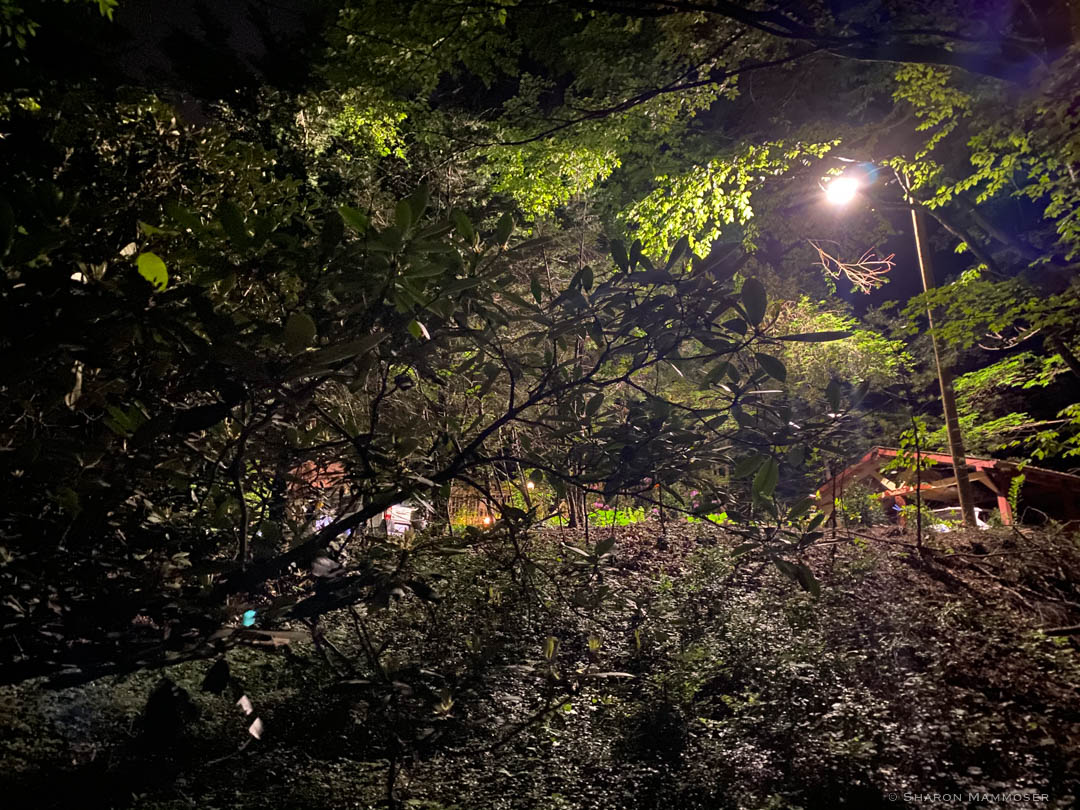
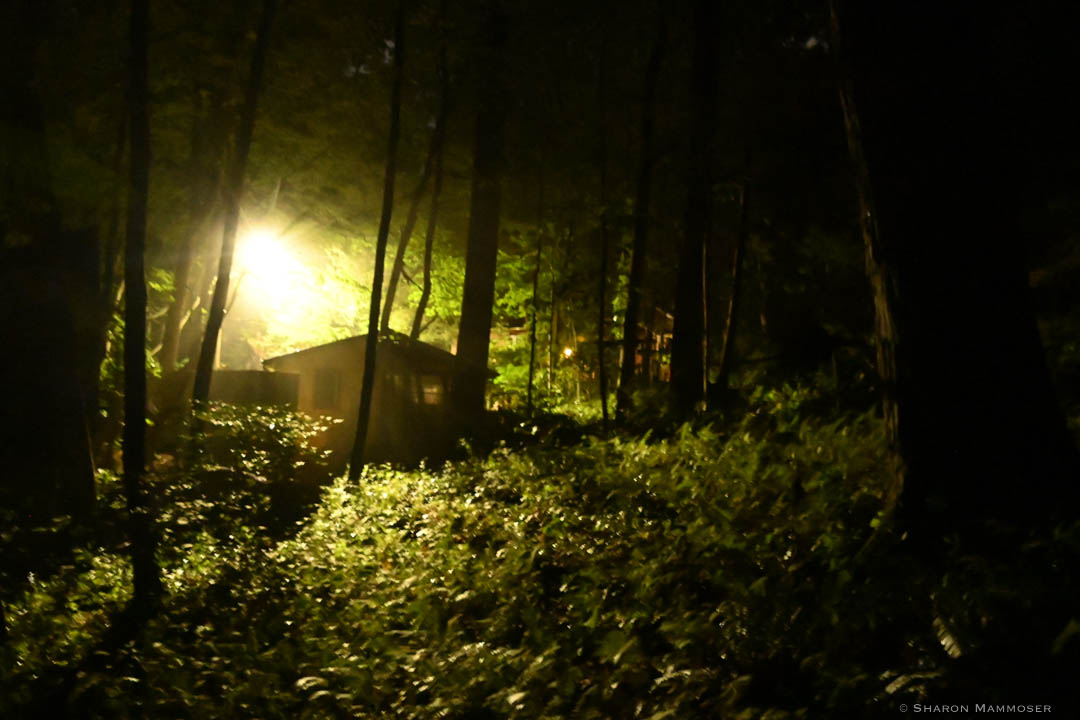
For the past two years we have been feuding with our neighbors over their very bright lights that trespass far onto our property, shining light 100 yards away on the forest floor as if someone above is holding an enormous spotlight from the heavens. The floodlights directed at my property are bad enough, but the tall streetlight that Duke Energy installed at the property line is the worst. Our shadows are visible now in much of our forest, even when there is no moon and the sky is filled with clouds. Worried about our special blue ghost fireflies and other wildlife, we tried repeatedly to reach a compromise with our neighbors, even offering to pay to put motion sensors on their lights, but, each suggestion was met with blunt refusal. Two years ago, to protect the habitat of our fireflies, we erected plastic tarps to try and lessen the impact of all of that artificial light. Our neighbors are now taking us to court over the matter, suing us over our plastic tarps. It would be easier and far less stressful to give in and remove the tarps, but we feel we must fight for the voiceless wildlife, and for ourselves, as we enjoy darkness and don’t think we should have to do without.
Some–including our neighbors– will say, “What’s the big deal with a few lights in the night? So what? Why do the lights matter? ”
According to The International Dark Sky Association,
Light pollution devastates wildlife.
It wastes energy and money.
Light pollution robs us of our heritage and may harm your health.
Here are some things that might surprise the average human about light pollution:
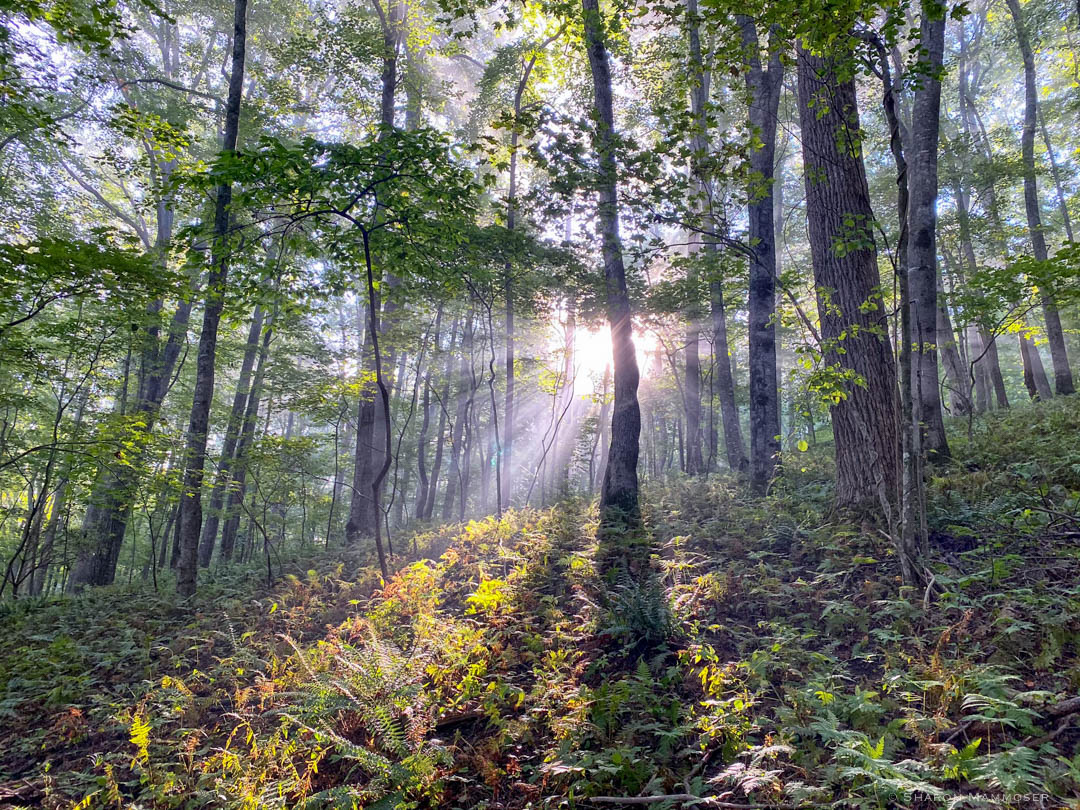
Did you know trees exposed regularly to bright artificial lights at night have a shortened life? The artificial lights make them hold onto their leaves longer into the fall than they should, weakening them and as a result, shortening their life.
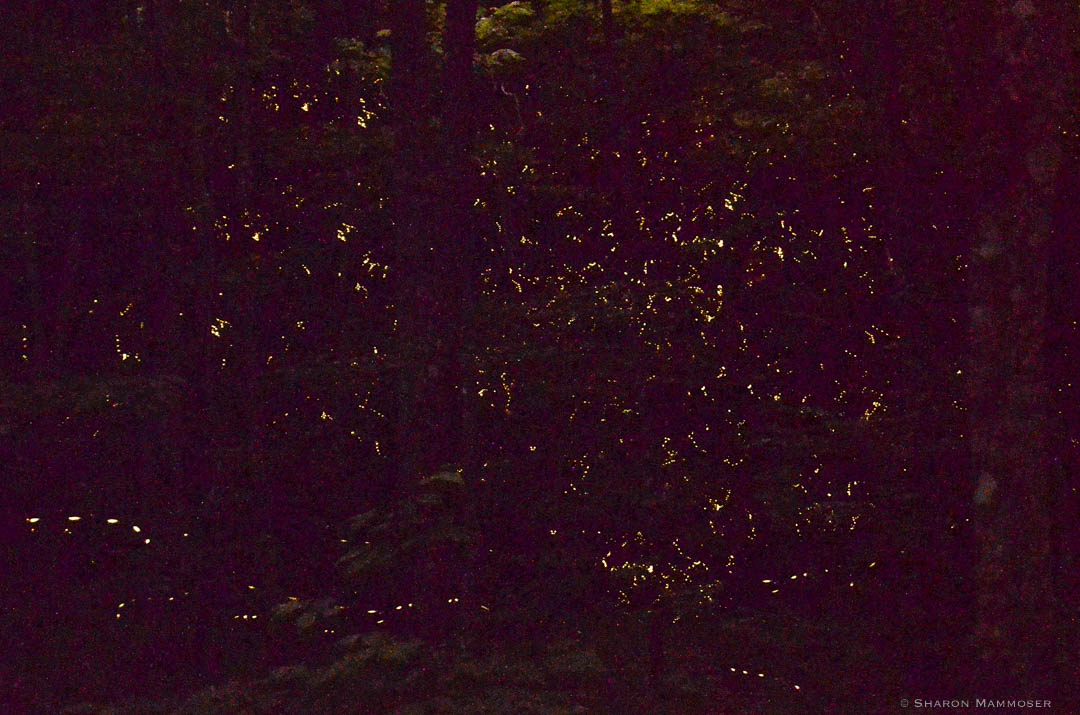
Did you know of the 2000 species of fireflies that live in North America, all require darkness for successful reproduction? When the night is lit up by artificial lights, the small insects have trouble finding each other, their little lanterns no match for the large, bright lights that steal the darkness. Or they use up all of their energy reserves traveling towards bright lights and then die before ever finding mates.
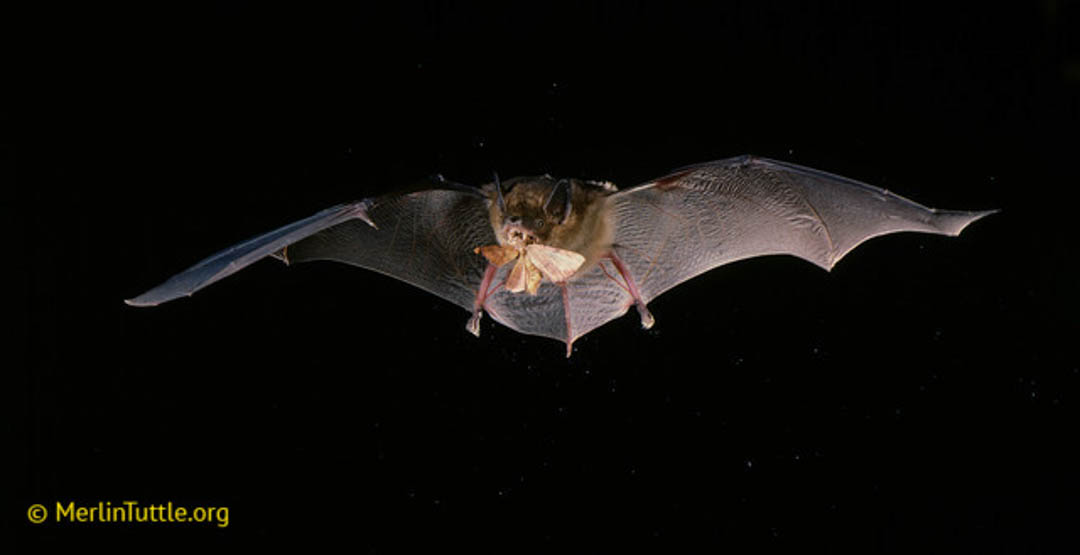
Did you know some bats will avoid the bright lights, not wanting to be seen by predators like owls or night hawks? And guess what that means? In those areas, there may be more mosquitoes and other insects.
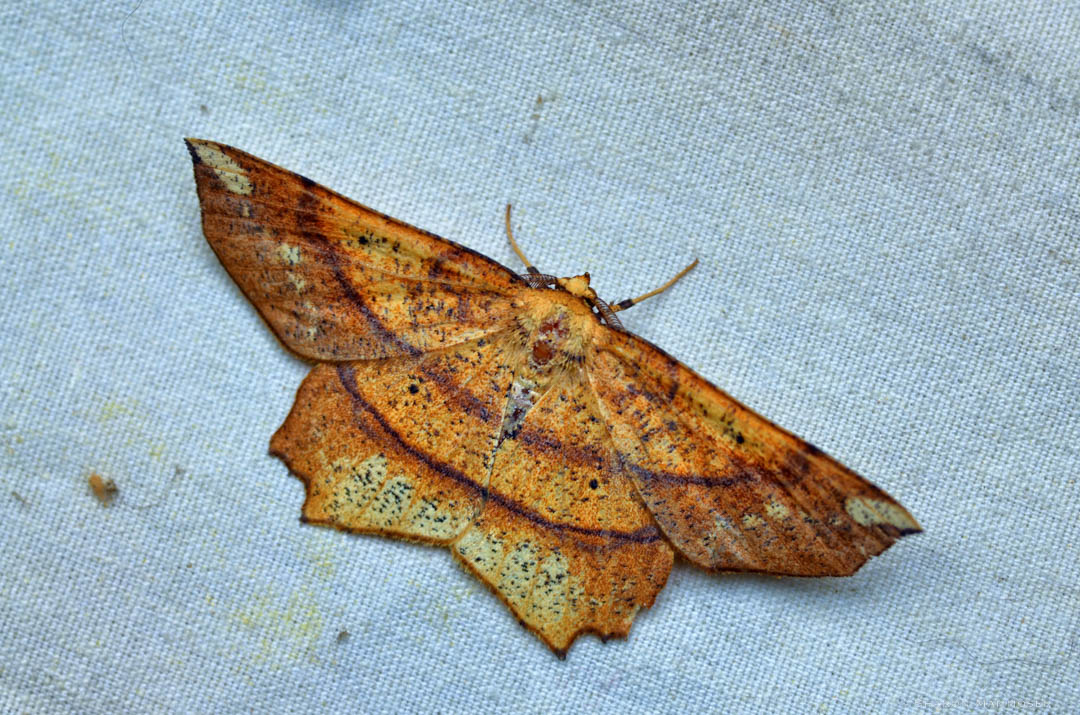
Did you know that many, many moths and other insects will be attracted to artificial lights and will then die? Because they use up their energy stores before finding mates, or they become disoriented, or they touch the hot bulbs and die on contact, or they get eaten by predators who don’t mind the bright lights, like spiders, hanging flies or birds.
Did you know migrating birds depend on the natural cycles of Mother Nature to give them cues about migrating? When the landscape is lit up at night, birds may wander off course, becoming disoriented and increasing chances for collisions with towers, houses or buildings.

Did you know many frogs and toads time their reproduction to the cycles of Mother Nature? When the night in areas where they live is lit up at night with artificial lights, their timing may be thrown off, thus causing them to miss small reproductive windows.
And lastly, did you know that humans are negatively affected by prolonged exposure to lights in the night? Because humans evolved with the rhythms of the Earth, including darkness during the night and light during the day, we are linked to these cycles. Like most life on Earth, we have a circadian rhythm that is essential to our master clock and our overall health. According to the International Dark Sky Association, this circadian rhythm “interacts with our body systems, changes our hormone levels, and even modifies our genetic code.” Disruption in our circadian rhythm “may increase our risk of obesity, diabetes, mood disorders, reproductive problems and even cancer. Numerous studies have linked working the night shift and exposure to light at night to increased risk for breast and prostate cancers and other health problems. ”
I hope you’ll join me in telling your friends and family to make changes to minimize our impact on the night. Imagine how different things could be if everyone cared enough about preserving our darkness to voluntarily take some steps to lessen our impact.
Here’re some changes (according to the International Dark Sky Association) you have the power to make at your homes to lessen light pollution:
- Use only fully shielded, IDA dark sky certified fixtures for all outdoor lighting, so lights shine down, not up.
- Use only the right amount of light needed. Too much light is wasteful and can create harsh shadows that impair vision.
- For outdoor lights, use controls such as timers, dimmers and motion sensors.
- Use warm color lights where possible. Limit the use of harmful blue wavelength lighting.
I hope you’ll help me in spreading the word about light pollution and how each one of us can make a difference.
Here’s a great film by the International Dark Sky Association about light pollution.
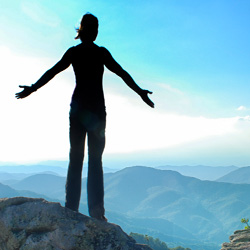
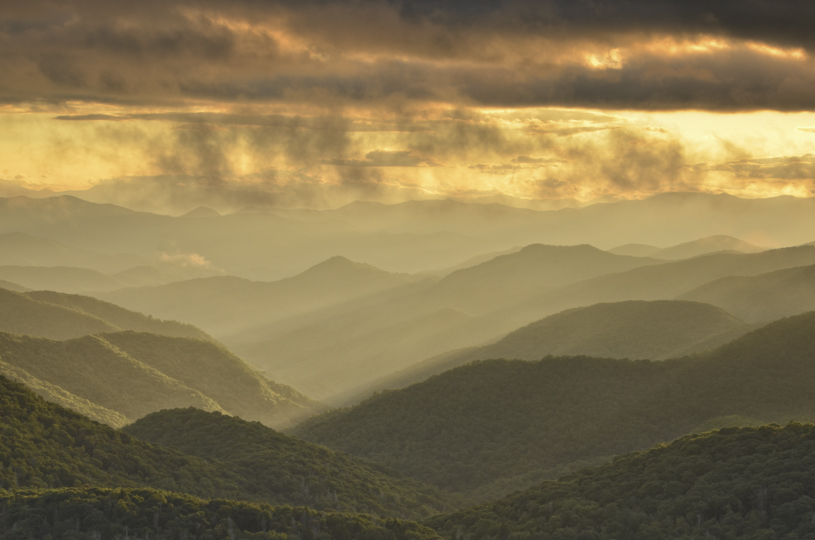
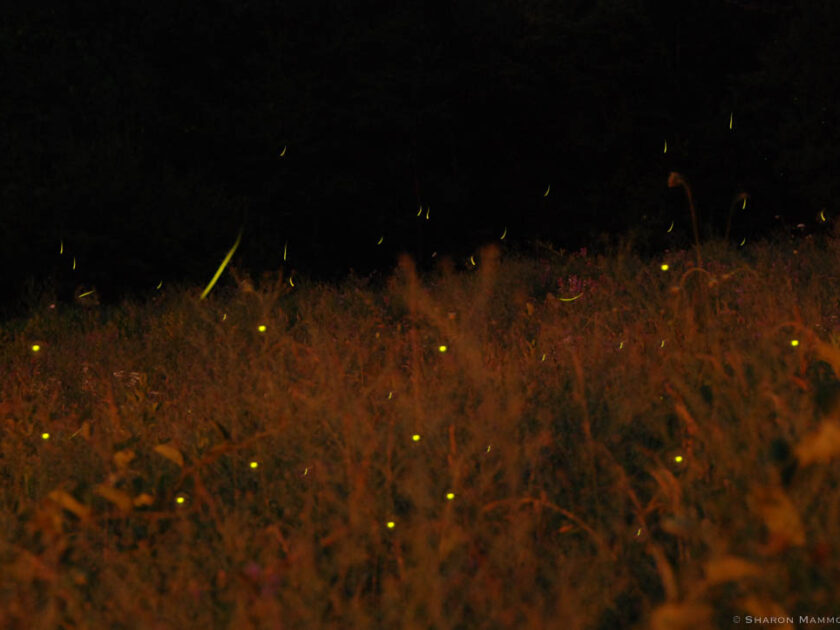
Ah yes I agree Big Bend is a magical place and those Chisos Mountains in the background make you feel like you’re on another planet! I once woke up in a tent in Big Bend because it was raining and watched the desert bloom over the next 10 hours, now that was surreal! I am so sorry to hear about your neighbor, dark skies are priceless. We were careful to buy our 50 acres at the end of a road backed up to the National Forest so we could protect our dark skies in NC. Sadly we had to experience the slow loss of dark skies in our previous home before it moved to the top 5 on our ‘desires list’ when seeking a new home. So important to wildlife!
Sara, I agree, dark skies ARE priceless. We thought being in the middle of 17 acres was going to be fabulous— and don’t get me wrong, it is. But being out here in the “country” means having to deal with many things we never dreamed of, like people shooting guns all the time, dogs barking at all hours, and now this latest neighbor who insists on lighting up the night. It’s heartbreaking to think our 17 acres will protect us from all that, only to learn it doesn’t. So baffling as to why people feel the need to move out here and then are so scared of the dark they must have lights on all night. I’m glad to hear you guys were forward thinking enough to make darkness a necessity.
Thanks for caring so much Sharon. I always share your emails in hopes of enlightening others. Sorry for your neighbor problems that you have been dealing with for sometime. It’s such a shame they don’t see the light!!
With gratitude,
Helen Kloock
Helen, thank YOU for reading my blog posts and then taking time to comment. And also for sharing them with people you know. I know I am mostly preaching to the choir with my posts, but I figure maybe someone will share it with someone who will share it with someone else and that way I’ll reach someone who didn’t know.